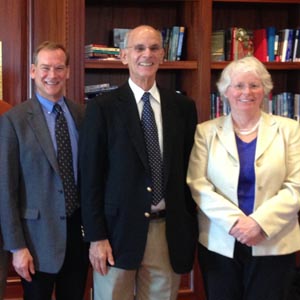Virginia Sapiro, dean of BU’s College of Arts & Sciences and professor of political science, has been chosen to receive the 2015 International Society for Political Psychology’s (ISPP) Harold Lasswell Award. The Lasswell Award is a lifetime achievement award given to one recipient each year for “distinguished scientific contributions in the field of political psychology.”
The ISPP, founded in 1978, is an interdisciplinary organization representing all fields of inquiry that explore the relationships between political and psychological processes. Members of the international society include psychologists, political scientists, psychiatrists, historians, sociologists, economists, anthropologists, as well as journalists, government officials, and others. Harold Lasswell (1902–1978), a past president of the American Political Science Association, was one of the first to apply psychology to the analysis of politics.
The award acknowledges Sapiro’s career accomplishments and gives her a vote of confidence as she prepares to jump back into research and teaching following her deanship.
Sapiro’s academic career has focused on political psychology, political behavior and public opinion, gender politics, and feminist and democratic theory. Before her arrival at BU, she spent 31 years on the faculty of the University of Wisconsin-Madison, where she held the distinguished Sophonisba P. Breckinridge Professorship of Political Science and Women’s Studies. She was one of the first political scientists ever to achieve tenure at a major research university through research and publication that focused exclusively on topics of gender and politics. Within the field of gender and politics, her work has been diverse in its methods and applications, and she introduced some important new lines of work that have made a difference in the direction the field has taken.
Some of Sapiro’s notable achievements include her membership in the American Academy of Arts and Sciences, the Breckinridge Professorship, and the University of Wisconsin Hilldale Award in the Social Sciences for excellence in teaching, research, and service. Sapiro also received the ISPP’s Erik Erikson Early Career Award in 1986. She served as the director of the American National Election Studies, the benchmark scholarly study of the American electorate that has been running since 1948—a key post in the study of elections and public opinion not just in the United States, but internationally.
Sapiro has served in many leadership capacities in professional organizations, including secretary and vice president of the American Political Science Association (APSA); president of the APSA Organized Section on Elections, Public Opinion, and Voting Behavior; and executive council member of the Midwest Political Science Association and the International Society for Political Psychology.
She has also contributed her professional services to the wider community. She served on the Equal Justice Task Force of the State Bar of Wisconsin in 1989–90, and as a participant in the 1991 United Nations Expert Group Meeting on the role of women in public life.
Sapiro has high ambitions for her renewed research career. She plans to write a history of higher education in the United States, focusing on its fascinating and unique complexity. She also plans to take up a project she spent many years developing before her arrival at BU, on the history of political action in the United States; her focus will be on understanding how certain human activities (e.g., economic behavior, violence, various forms of communication) come to be understood and deployed as political activities. She is especially interested in the way people who have few political rights and may not even have access to voting find ways to make a difference politically.
These are themes that drew Sapiro to study the intersection of politics and psychology in the first place and continue to animate her research.
“Politics matter,” she says. “People have sacrificed their lives for democracy, for the right to have a part in self-governance and to make a difference in policy. How people work together to make decisions under conditions of scarce resources, how they come together to make decisions across important and fundamental differences of opinion, matters. And having been part of a group that, until recently, was largely excluded from so many avenues of political action and impact made me realize even more how important all of this is. Sometimes I say that I am deeply motivated to understand why people think and do the things in politics they do when they could do so much better.”
The 2015 Lasswell Award will be given at the ISPP’s annual meeting in summer 2015 in San Diego, and Sapiro will be expected to deliver the Lasswell lecture at the summer 2016 meeting in Warsaw, Poland.
A version of this article was originally published in the BU Arts & Sciences website.
















































Virginia is a credit to academia and Boston University and holds the value of a strong balanced liberal arts education as a pedestal upon which the richness of life can be built. She “gets it” when it comes to self-exploration and research and teaching and as our Dean of the core undergraduate and graduate school at BU, she mixes high standards with compassion…and does so with great grace and dignity.